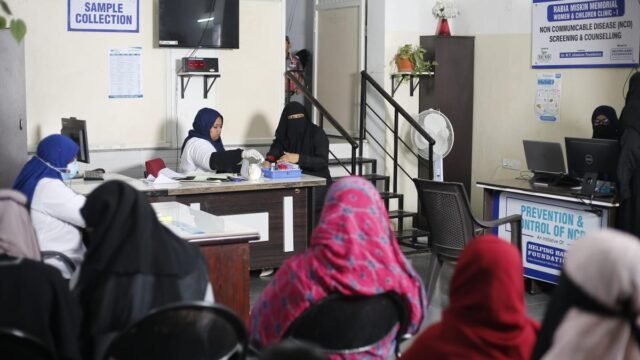
A clinic run by the NGO Helping Hand Foundation.
A recent health impact study undertaken by Hyderabad-based NGO Helping Hand Foundation (HHF) showed improvements in the health, social and financial well-being of residents in over 100 urban slums in Hyderabad.
The study surveyed 4,000 respondents across 12 primary health centres (PHCs) run by HHF, which collectively serve an estimated population of eight to nine lakh. These centres cater to populations grappling with poverty, migration and inadequate access to quality healthcare.
The PHCs are in Hakeempet, Khyamnagar, Rajendra Nagar, Hasan Nagar, Kalapathar, Achi Reddy Nagar, Ghouse Nagar, Toor Colony, Shaheen Nagar, Wadi-e-Saleheen, Wadi-e-Mustafa and Rajiv Gandhi Nagar.
Nearly two-thirds of the respondents were aged 35 or younger. Women benefited the most, with 73.5% utilising the PHC services compared to 26.5% of men. Seventy-two per cent of the beneficiaries were migrant workers from neighbouring states such as Karnataka and Maharashtra, as well as northern states such as Uttar Pradesh, Jharkhand and Bihar. These migrant labourers, often employed in low-paying jobs, face vulnerability due to their limited access to healthcare, said Mujtaba Hasan Askari of HHF.
Over one-third of the surveyed families reported earning less than ₹10,000 a month. Many of these individuals work as day labourers or in menial salaried positions, leaving little room for health-related expenses. The proximity of the PHCs proved to be a lifeline for many, with 64% of respondents living less than a kilometre away and preferring to walk to the centres to save on transportation costs. Regular visits to the centres were common, with 58% of respondents making between one and four visits each month.
The survey also revealed that nearly half of those suffering from chronic diseases such as diabetes and hypertension reported improvements in their health. Additionally, 50% of the respondents experienced better mental and emotional well-being after receiving consistent care. Seventy-four per cent of the beneficiaries expressed satisfaction with the range and quality of care received.
By providing free primary healthcare, the organisation enabled 81% of the respondents to save between ₹2,500 and ₹3,000 a month on medical expenses, said Mr. Askari. This financial relief allowed many families to redirect funds toward essential needs such as better nutrition, education and transportation for their children. Moreover, 65% of the beneficiaries reported that they no longer needed to rely on high-interest loans to cover medical costs.
“With an estimated 5.5 lakh patients expected to utilise its services this year alone, HHF continues to be a vital pillar of support for vulnerable populations in urban and peri-urban slums, said Mr. Askari.
Published – December 15, 2024 06:31 pm IST






